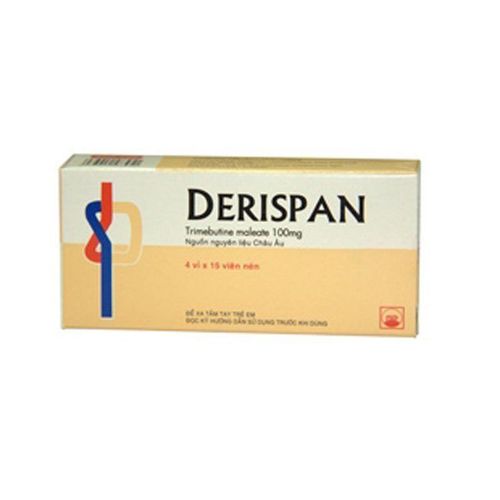This is an automatically translated article.
Indavix contains Trimebutine, a spasmolytic agent used to treat irritable bowel syndrome, lower gastrointestinal motility disorders, and other digestive disorders.
1. What is Indavix?
Indavix has the main ingredient Trimebutin maleate 100mg, belongs to the group of gastrointestinal drugs. Indicated for use in the treatment of cases such as:
Digestive dysfunction, including symptoms such as gastritis, gastroesophageal reflux, esophageal hernia, duodenitis, gastric ulcer duodenum (abdominal pain, dyspepsia, nausea, vomiting). Treatment of irritable bowel syndrome. Treatment of frequent vomiting, constipation, diarrhea in children. Mechanism of action:
Trimebutine belongs to the group of antispasmodics. Trimebutine works by slowing or normalizing abnormal bowel movements.
2. Dosage and how to take Indavix
Usage:
The drug is produced and packaged in the form of film-coated tablets, using the drug through the mouth. In order for the drug to be most effective, patients should take it before meals, because the amount of food in the stomach can affect the body's ability to absorb the drug. Dosage:
Recommended dose for adults is 100mg-200mg x 3 times/day before meals, maximum dose up to 600mg daily, divided into 3 times (200mg 3 times daily). Overdose and treatment:
There are currently no reports of patients' reactions or symptoms when taking an overdose. When a patient uses an overdose of the drug and notices unusual symptoms in the body, they should contact their doctor for further advice. In case of taking too high a dose, the doctor may prescribe gastric lavage to reduce the toxin that the drug causes.
3. Indavix side effects
A side effect is an unwanted reaction when a drug is taken in normal doses. Side effects that occur can be mild or severe, temporary or long-lasting. The following are some side effects that patients may experience when taking Indavix:
Dry mouth, nausea, diarrhea, constipation; Drowsiness, dizziness, fatigue, or headache; Increased liver enzymes, rash, palpitations. Some side effects that affect the central nervous system include drowsiness, fatigue, dizziness, feeling hot and cold, and headache.
4. Be careful when using Indavix
For children: This medicine is not recommended for use in children under 12 years of age. Breast-feeding: There are no studies to confirm whether the Trimebutine ingredient in Indavix can pass into breast milk. If the patient is breast-feeding, consult a doctor before use. For pregnant women: Pregnant women should not use Trimebutine.
5. Drug interactions
Patients should tell their doctor about all prescription and over-the-counter medications they are taking to avoid drug interactions that lead to unwanted side effects. The following are some drugs that may cause interactions when taken with Indavix:
Abacavir: Abacavir may decrease the rate of excretion of Trimebutine, which may lead to higher serum concentrations; Abametapir: The serum concentration of Trimebutine may be increased when it is combined with Abametapir; Acarbose: The risk or severity of hypoglycemia may be increased when Trimebutine is combined with Acarbose; Acebutolol: Acebutolol may increase the arrhythmic activity of Trimebutine; Aceclofenac: The risk or severity of hyperkalemia may be increased when Aceclofenac is combined with Trimebutine; Acetazolamide: Acetazolamide may increase the CNS depressant activity of Trimebutine; Ajmaline: Ajmaline may increase the arrhythmic activity of Trimebutine; Agomelatine: Agomelatine may increase the CNS depressant activities of Trimebutine; Adenosine: Adenosine may increase the arrhythmic activity of Trimebutine; Acetophenazine: Acetophenazine may increase the activity of the central nervous system depressant (CNS depressant) of Trimebutine. The basic information about Indavix in the above article is for reference only. Because this is a prescription drug, patients should not use it on their own, but need to contact a specialist directly to get an appropriate prescription to ensure safety for health.













